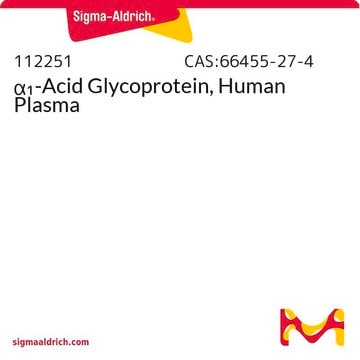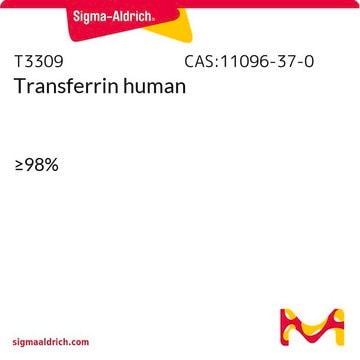G3643
α1-Acid Glycoprotein from bovine plasma
≥99%
Synonym(s):
Orosomucoid
About This Item
Recommended Products
biological source
bovine plasma
Assay
≥99%
form
powder
technique(s)
electrophoresis: suitable
mass spectrometry (MS): suitable
UniProt accession no.
storage temp.
2-8°C
Gene Information
bovine ... ORM1(497200)
Looking for similar products? Visit Product Comparison Guide
General description
Application
- in mass spectrometry analysis to confirm the presence of Neu5Ac and Neu5Gc distribution in human and bovine AGP respectively
- for pretreating the microvessel before perfusing the MDA-MB-231 cells for tumor adhesion studies
- in the composition of tear model
- as a reference in sodium dodecyl sulphate-polyacrylamide gel electrophoresis (SDS-PAGE)
Biochem/physiol Actions
Storage Class Code
11 - Combustible Solids
WGK
WGK 3
Flash Point(F)
Not applicable
Flash Point(C)
Not applicable
Personal Protective Equipment
Certificates of Analysis (COA)
Search for Certificates of Analysis (COA) by entering the products Lot/Batch Number. Lot and Batch Numbers can be found on a product’s label following the words ‘Lot’ or ‘Batch’.
Already Own This Product?
Find documentation for the products that you have recently purchased in the Document Library.
Customers Also Viewed
Articles
PNGase Fast denaturing buffer and enzyme provide results similar to a conventional 20-hour protocol, reducing workflow time to about 1 hour.
PNGase Fast denaturing buffer and enzyme provide results similar to a conventional 20-hour protocol, reducing workflow time to about 1 hour.
PNGase Fast denaturing buffer and enzyme provide results similar to a conventional 20-hour protocol, reducing workflow time to about 1 hour.
PNGase Fast denaturing buffer and enzyme provide results similar to a conventional 20-hour protocol, reducing workflow time to about 1 hour.
Our team of scientists has experience in all areas of research including Life Science, Material Science, Chemical Synthesis, Chromatography, Analytical and many others.
Contact Technical Service














